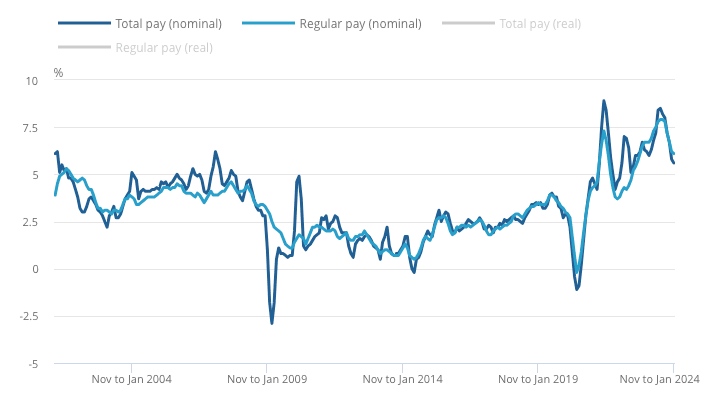Pound Sterling Under Pressure Against Euro, Dollar Following Wages Decline


Image © Adobe Stock
UK wage and employment data undershot market expectations, boosting the odds of a June rate cut at the Bank of England and resulting in a broadly weaker British Pound.
The Pound to Euro exchange rate extended the current week’s decline to 1.1708 after the ONS said average earnings, with bonuses included, rose 5.6% in January, which was softer than the 5.7% expected and below December’s 5.8%. The exchange rate had been as high as 1.1750 early on Monday.
When bonuses are excluded, average earnings rose 6.1%, down on the 6.2% of December, which was also the level the market consensus expected.
The Pound to Dollar exchange rate was also softer, trading at 1.28 in the minutes following the data release.
The ONS reported that the unemployment rate unexpectedly rose to 3.9% in January from December’s 3.8%, as employment fell 21k in the three months to January compared to the three months to November.
The estimated number of vacancies in the UK fell by 43K in the three months to February to 908K.
UK wages remain too high to be consistent with the Bank of England’s aim of achieving 2.0% inflation on a sustainable basis, but the trend is clear. Falling vacancies and a rising unemployment rate suggest an ongoing process of labour market loosening that will exert further downward pressure on wages, allowing the Bank of England to cut rates in the summer.
The Pound can come under pressure if upcoming data raise the odds of a June interest rate hike.
“The easing in wage growth in January is probably still a bit too slow for the Bank of England’s liking. But there are encouraging signs that a more marked slowdown is just around the corner and that an interest rate cut in June is possible,” says Paul Dales, Chief UK Economist at Capital Economics.
However, Kyle Chapman, FX Markets Analyst at Ballinger Group, says the decline in wage growth is encouraging “but certainly not a victory for the Bank of England”, which will still be looking for a cautious approach to cutting interest rates.
“Slowing vacancies is a clear sign that the labour market is heading in the right direction. But for us, this report broadly confirms again that worries about inflationary persistence are not unfounded. The August cut will require a turning point in the data that we are yet to see,” he says.
Source link







